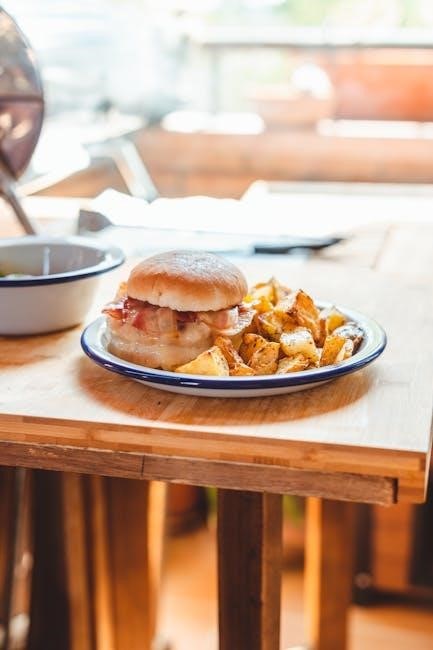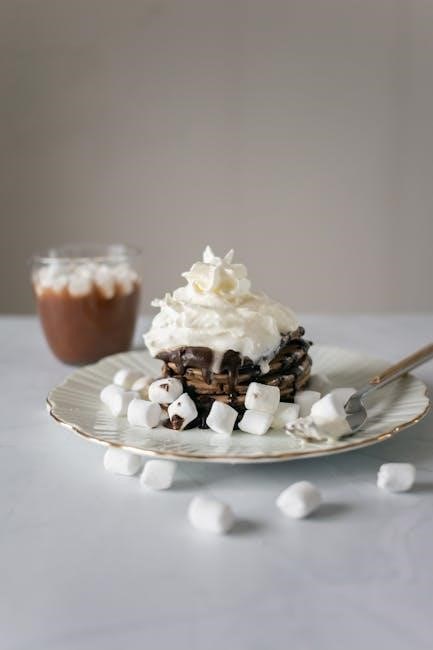A 1700 calorie meal plan is a structured approach to nutrition, designed to promote weight loss and muscle maintenance. It balances macronutrients and offers customizable options for diverse dietary needs.
Overview of the 1700 Calorie Diet
The 1700 calorie diet is a structured meal plan designed for weight loss and muscle maintenance, typically split into 5-6 meals daily. It emphasizes macronutrient balance, often targeting a 40/40/20 distribution of protein, carbohydrates, and fats. This plan is ideal for individuals seeking gradual weight loss of 1-2 pounds per week while preserving lean muscle mass. Meals are carefully portioned to meet calorie goals and nutritional needs, with a focus on whole foods, lean proteins, and healthy fats. The plan is customizable to suit personal preferences and dietary requirements, making it sustainable for long-term use.
Importance of Macronutrient Balance
Macronutrient balance is crucial for optimizing weight loss and overall health. Protein, carbohydrates, and fats each play vital roles: protein supports muscle maintenance, carbohydrates provide energy, and fats aid hormone function. A balanced diet ensures sustained energy levels and prevents nutrient deficiencies. For a 1700-calorie plan, a typical split is 40% protein, 40% carbohydrates, and 20% fats, though this may vary based on individual goals. Proper balance prevents excessive loss of muscle mass during weight loss and supports metabolic health. It also enhances satiety and reduces cravings, making the diet more sustainable. Balancing macronutrients ensures the body functions optimally.
Understanding the Macronutrient Split
The 1700-calorie meal plan typically follows a macronutrient split of 40-50% protein, 25-30% carbohydrates, and 20-25% fats, optimizing weight loss and muscle maintenance effectively.
Protein, Carbohydrates, and Fats Distribution
A 1700-calorie meal plan typically allocates 40-50% of calories to protein, 25-30% to carbohydrates, and 20-25% to fats. Protein supports muscle maintenance and satiety, while carbohydrates provide energy, and fats aid in hormone production and nutrient absorption. This balanced distribution ensures sustained energy levels and prevents nutrient deficiencies. For example, a high-protein intake of 130-164 grams daily aligns with this plan, supporting both weight loss and muscle preservation. Carbohydrates are often sourced from whole grains, fruits, and vegetables, while healthy fats come from nuts, seeds, and avocados. This macronutrient split is customizable to suit individual goals and preferences, ensuring a nutritionally complete diet.
Recommended Daily Protein Intake
The recommended protein intake on a 1700-calorie meal plan is approximately 130-164 grams per day, representing 30-35% of total calories. This supports muscle maintenance and gradual weight loss of 1-2 pounds weekly. Protein-rich foods like lean meats, fish, eggs, tofu, and legumes are emphasized. Adequate protein intake helps preserve muscle mass during calorie restriction and promotes satiety, reducing hunger and cravings. Adjustments may be needed based on individual factors like activity level, age, and fitness goals, ensuring the diet remains effective and sustainable for overall health and wellness.
Benefits of a 1700 Calorie Meal Plan
A 1700-calorie meal plan supports weight loss, maintains muscle mass, and boosts energy levels, helping you achieve a balanced and sustainable approach to your health goals.
Weight Loss and Muscle Maintenance
A 1700-calorie meal plan is ideal for weight loss while preserving muscle mass. By maintaining a calorie deficit, it promotes fat loss without sacrificing lean tissue. High protein intake, typically 130-164 grams daily, supports muscle maintenance and repair, ensuring strength is preserved during weight loss. This balance allows for gradual weight reduction of 1-2 pounds per week, a sustainable pace for long-term success. The plan’s macronutrient distribution ensures energy levels stay consistent, preventing muscle breakdown and supporting overall health. This approach is particularly beneficial for those aiming to lose weight while maintaining an active lifestyle or engaging in regular physical training.
Improved Energy Levels
A 1700-calorie meal plan, with balanced macronutrients, helps maintain consistent energy levels throughout the day; Protein-rich meals support muscle function, while complex carbohydrates provide sustained energy. Healthy fats, such as avocados and nuts, contribute to long-lasting vitality. The plan emphasizes whole foods like fruits, vegetables, and whole grains, which are rich in fiber and essential nutrients. This balanced approach prevents energy crashes and keeps you energized for daily activities. Staying hydrated and including water-rich foods further enhances energy levels, ensuring you feel vibrant and focused. This makes the plan ideal for those with active lifestyles or demanding schedules.

Sample 7-Day Meal Plan
This structured 7-day meal plan provides balanced meals and snacks, ensuring daily nutrition goals are met. It includes healthy recipes and customizable options for sustainable weight management.
Breakfast Options
Breakfast options in a 1700-calorie meal plan focus on balanced nutrition to start your day. High-protein choices like eggs, Greek yogurt, or cottage cheese are popular. Pair these with whole grains, such as oatmeal or whole-grain toast, for sustained energy. Include lean meats or plant-based alternatives for added protein. Vegetables like spinach, mushrooms, or bell peppers can enhance flavor and nutrients. Fresh fruits, such as berries or bananas, provide natural sweetness and fiber. Portion control is key to staying within calorie goals. These breakfast ideas ensure a nutritious and satisfying start to your day while supporting your overall dietary objectives.
Lunch and Dinner Ideas
Lunch and dinner in a 1700-calorie meal plan focus on balanced nutrition with lean proteins, complex carbs, and healthy fats. Grilled chicken, turkey, or fish are excellent protein sources, paired with quinoa, brown rice, or whole-grain pasta. Vegetables like broccoli, spinach, or bell peppers add fiber and nutrients. For variety, include plant-based options like lentils or tofu. Salads with avocado, nuts, and olive oil dressings offer healthy fats. Portion control is key to staying within calorie goals. These meals ensure sustained energy and satisfaction while supporting weight management and muscle maintenance, making them ideal for a structured diet plan.
Healthy Snack Choices
Healthy snacks are essential to maintain energy levels and prevent overeating. Opt for nutrient-dense options like nuts, seeds, hard-boiled eggs, or Greek yogurt. Fresh fruits, veggie sticks with hummus, or whole-grain crackers with avocado are excellent choices. Protein-rich snacks, such as cottage cheese or a protein bar, support muscle maintenance; Portion control is key to staying within calorie limits. Incorporate a mix of complex carbs, lean proteins, and healthy fats to keep you satisfied. These snacks not only curb cravings but also align with the overall goals of the 1700-calorie meal plan, ensuring balanced nutrition without excessive calorie intake.

Customizing the Meal Plan
Customizing your 1700-calorie meal plan allows for personalization based on dietary needs and preferences. Swap ingredients to maintain variety while staying within calorie and macronutrient goals.
Adjusting for Personal Preferences
Adjusting the 1700-calorie meal plan for personal preferences ensures sustainability and satisfaction. Incorporate your favorite protein sources, vegetables, and whole grains while maintaining calorie and macronutrient balance. For instance, swap chicken for fish or tofu, and replace rice with quinoa. Choose snacks that align with your taste, like nuts or fruits. This flexibility keeps meals exciting and tailored to your lifestyle, making it easier to adhere to the plan long-term. By personalizing, you enhance enjoyment and commitment, which are key to achieving your health and fitness goals effectively.
Swapping Ingredients for Variety
Swapping ingredients is a great way to add variety to your 1700-calorie meal plan without compromising its nutritional balance. For example, you can replace chicken with turkey, fish, or tofu for a protein switch. Carbohydrates like brown rice can be substituted with quinoa or whole-grain pasta. Vegetables such as broccoli or spinach can be interchanged to keep meals interesting. Similarly, healthy fats like avocado or nuts can be swapped to diversify flavors. These substitutions maintain calorie and macronutrient targets while keeping your diet enjoyable and preventing boredom. This flexibility ensures you stay motivated and engaged with your meal plan long-term.
Grocery List and Meal Prep Tips

Stock essential items like lean proteins, whole grains, and vegetables to support your 1700-calorie plan. Prepping meals in advance saves time and ensures consistency. Stay organized with portioned ingredients and a weekly schedule to maintain your goals effectively.
Essential Items for the Plan
Stocking your pantry with essential items is crucial for a successful 1700-calorie meal plan. Focus on lean proteins like chicken, turkey, and fish, which are low in fat and high in protein. Include whole grains such as brown rice, quinoa, and whole-grain bread for sustained energy. Vegetables like spinach, broccoli, and bell peppers provide essential vitamins and fiber. Low-fat dairy products like Greek yogurt and skim milk support muscle maintenance. Healthy fats like avocado, nuts, and olive oil are also vital for overall health. Don’t forget to include herbs and spices to add flavor without extra calories, ensuring meals stay nutritious and delicious.
Time-Saving Meal Prep Strategies
Meal prepping is key to staying on track with your 1700-calorie plan. Start by planning meals for the week and creating a grocery list. Shop for all ingredients at once to avoid multiple trips. Portion meals in advance using containers, making grab-and-go options easy. Chop vegetables and marinate proteins ahead of time to streamline cooking. Use a slow cooker for hands-off meal preparation or batch-cook staples like rice and quinoa. Prepping snacks like trail mix or yogurt parfaits saves time during busy days. Organize your fridge and pantry to ensure everything is accessible. This approach reduces mealtime stress and keeps you consistent with your goals.

Tracking Progress and Staying Consistent
Consistency is crucial for success. Use a food diary to log meals and track macros. Regularly monitor weight and measurements to ensure progress toward your goals.
Using a Food Diary
A food diary is an essential tool for tracking progress on a 1700 calorie meal plan. By documenting every meal and snack, you can monitor calorie intake, macronutrient balance, and portion sizes. Writing down your meals helps identify patterns and ensures accountability. Include details like food quantities, cooking methods, and hunger levels before and after eating. Regularly reviewing your diary can reveal areas for improvement and help maintain consistency. Over time, this habit fosters mindfulness and supports long-term adherence to your diet plan, making it easier to achieve and sustain your weight and health goals.
Monitoring Weight and Measurements
Regularly monitoring weight and measurements is crucial for tracking progress on a 1700 calorie meal plan. Weigh yourself weekly at the same time to ensure consistency and accuracy. Take body measurements, such as waist and hip circumference, to assess fat loss and muscle retention. Keep a record of these metrics to visualize improvements over time. Tracking progress helps identify patterns and make necessary adjustments to your diet or exercise routine. Remember, weight fluctuations can occur due to water retention or other factors, so focus on overall trends rather than daily changes. Consistency and patience are key to achieving your goals.
A 1700 calorie meal plan supports weight loss and muscle maintenance while balancing nutrients. Stay consistent, track progress, and consult a professional for personalized adjustments and success.
Final Tips for Success
Consistency is key to achieving your goals with a 1700 calorie meal plan. Meal prep in advance to avoid last-minute unhealthy choices. Track your progress using a food diary to monitor intake and adjustments. Stay hydrated throughout the day to support metabolism and digestion. Incorporate physical activity to enhance weight loss and muscle maintenance. Consider consulting a nutritionist to tailor the plan to your specific needs. Finally, ensure adequate sleep and manage stress to optimize results. By following these tips, you’ll stay on track and maximize the benefits of your 1700 calorie meal plan for sustainable success.
